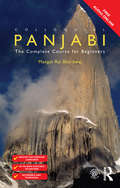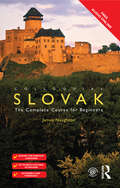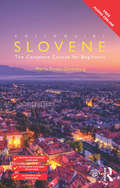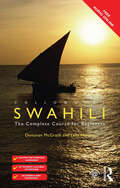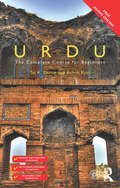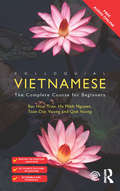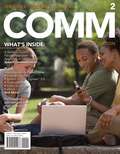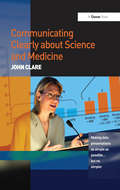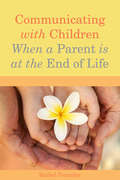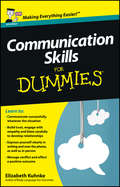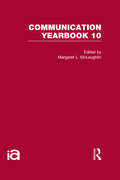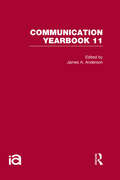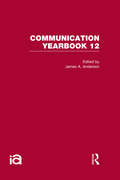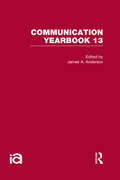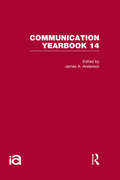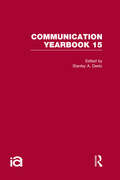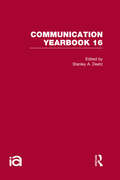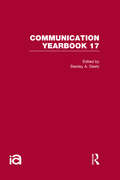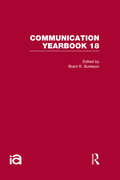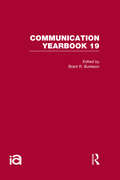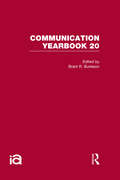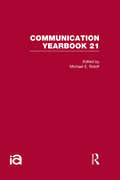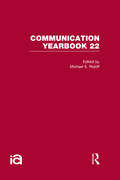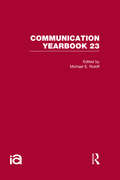- Table View
- List View
Colloquial Panjabi: The Complete Course for Beginners (Colloquial Ser.)
by Mangat Rai BhardwajColloquial Panjabi: The Complete Course for Beginners has been carefully developed by an experienced teacher to provide a step-by-step course to Panjabi as it is written and spoken today. Combining a clear, practical and accessible style with a methodical and thorough treatment of the language, it equips learners with the essential skills needed to communicate confidently and effectively in Panjabi in a broad range of situations. No prior knowledge of the language is required. Colloquial Panjabi is exceptional; each unit presents a wealth of grammatical points that are reinforced with a wide range of exercises for regular practice. A full answer key, a grammar summary, bilingual glossaries and English translations of dialogues can be found at the back as well as useful vocabulary lists throughout. Key features include: A clear, user-friendly format designed to help learners progressively build up their speaking, listening, reading and writing skills Jargon-free, succinct and clearly structured explanations of grammar An extensive range of focused and dynamic supportive exercises Realistic and entertaining dialogues covering a broad variety of narrative situations Helpful cultural points explaining the customs and features of life in Panjabi-speaking areas. An overview of the sounds of Panjabi Balanced, comprehensive and rewarding, Colloquial Panjabi is an indispensable resource both for independent learners and students taking courses in Panjabi. Audio material to accompany the course is available to download free in MP3 format from www.routledge.com/cw/colloquials. Recorded by native speakers, the audio material features the dialogues and texts from the book and will help develop your listening and pronunciation skills. A wealth of additional text material is also provided on the website. This supplementary material builds on the foundation provided in the Colloquial Panjabi course and will develop your language skills beyond the beginner level into intermediate study.
Colloquial Slovak: The Complete Course for Beginners (Colloquial Ser.)
by James NaughtonColloquial Slovak: The Complete Course for Beginners has been carefully developed by an experienced teacher to provide a step-by-step course to Slovak as it is written and spoken today. Combining a clear, practical and accessible style with a methodical and thorough treatment of the language, it equips learners with the essential skills needed to communicate confidently and effectively in Slovak in a broad range of situations. No prior knowledge of the language is required. Colloquial Slovak is exceptional; each unit presents a wealth of grammatical points that are reinforced with a wide range of exercises for regular practice. A full answer key, a grammar summary, bilingual glossaries and English translations of dialogues can be found at the back as well as useful vocabulary lists throughout. Key features include: A clear, user-friendly format designed to help learners progressively build up their speaking, listening, reading and writing skills Jargon-free, succinct and clearly structured explanations of grammar An extensive range of focused and dynamic supportive exercises Realistic and entertaining dialogues covering a broad variety of narrative situations Helpful cultural points explaining the customs and features of life in Slovakia An overview of the sounds of Slovak Balanced, comprehensive and rewarding, Colloquial Slovak is an indispensable resource both for independent learners and students taking courses in Slovak. Audio material to accompany the course is available to download free in MP3 format from www.routledge.com/cw/colloquials. Recorded by native speakers, the audio material features the dialogues and texts from the book and will help develop your listening and pronunciation skills.
Colloquial Slovene: The Complete Course for Beginners (Colloquial Ser.)
by Marta Pirnat-GreenbergColloquial Slovene: The Complete Course for Beginners has been carefully developed by an experienced teacher to provide a step-by-step course to Slovene as it is written and spoken today. Combining a clear, practical and accessible style with a methodical and thorough treatment of the language, it equips learners with the essential skills needed to communicate confidently and effectively in Slovene in a broad range of situations. No prior knowledge of the language is required. Colloquial Slovene is exceptional; each unit presents a wealth of grammatical points that are reinforced with a wide range of exercises for regular practice. A full answer key, a grammar summary, bilingual glossaries and English translations of dialogues can be found at the back as well as useful vocabulary lists throughout. Key features include: A clear, user-friendly format designed to help learners progressively build up their speaking, listening, reading and writing skills Jargon-free, succinct and clearly structured explanations of grammar An extensive range of focused and dynamic supportive exercises Realistic and entertaining dialogues covering a broad variety of narrative situations Helpful cultural points explaining the customs and features of life in Slovenia. An overview of the sounds of Slovene Balanced, comprehensive and rewarding, Colloquial Slovene is an indispensable resource both for independent learners and students taking courses in Slovene. Audio material to accompany the course is available to download free in MP3 format from www.routledge.com/cw/colloquials. Recorded by native speakers, the audio material features the dialogues and texts from the book and will help develop your listening and pronunciation skills.
Colloquial Swahili: The Complete Course for Beginners (Colloquial Ser.)
by Donovan McGrath Lutz MartenColloquial Swahili: The Complete Course for Beginners has been carefully developed by an experienced teacher to provide a step-by-step course to Swahili as it is written and spoken today. Combining a clear, practical and accessible style with a methodical and thorough treatment of the language, it equips learners with the essential skills needed to communicate confidently and effectively in Swahili in a broad range of situations. No prior knowledge of the language is required. Colloquial Swahili is exceptional; each unit presents a wealth of grammatical points that are reinforced with a wide range of exercises for regular practice. A full answer key, a grammar summary, bilingual glossaries and English translations of dialogues can be found at the back as well as useful vocabulary lists throughout. Key features include: A clear, user-friendly format designed to help learners progressively build up their speaking, listening, reading and writing skills Jargon-free, succinct and clearly structured explanations of grammar An extensive range of focused and dynamic supportive exercises Realistic and entertaining dialogues covering a broad variety of narrative situations Helpful cultural points explaining the customs and features of life in Swahili-speaking countries. An overview of the sounds of Swahili Balanced, comprehensive and rewarding, Colloquial Swahili is an indispensable resource both for independent learners and students taking courses in Swahili. Audio material to accompany the course is available to download free in MP3 format from www.routledge.com/cw/colloquials. Recorded by native speakers, the audio material features the dialogues and texts from the book and will help develop your listening and pronunciation skills.
Colloquial Urdu: The Complete Course for Beginners (Colloquials Ser.)
by Tej K Bhatia Ashok Khoul Ashok KoulColloquial Urdu provides a step-by-step course in Urdu as it is written and spoken today. Combining a user-friendly approach with a thorough treatment of the language, it equips learners with the essential skills needed to communicate confidently and effectively in Urdu in a broad range of situations. No prior knowledge of the language is required. Key features include: progressive coverage of speaking, listening, reading and writing skills structured, jargon-free explanations of grammar an extensive range of focused and stimulating exercises realistic and entertaining dialogues covering a broad variety of scenarios useful vocabulary lists throughout the text additional resources available at the back of the book, including a full answer key, a grammar summary, bilingual glossaries and English translations of dialogues. This second edition has been extensively updated and revised throughout, with particular attention to the Urdu script – coverage is now integrated throughout the book and the script font has been enlarged and improved. Balanced, comprehensive and rewarding, Colloquial Urdu will be an indispensable resource both for independent learners and for students taking courses in Urdu. By the end of this course, you will be at Level B2 of the Common European Framework for Languages and at the Intermediate-High on the ACTFL proficiency scales. Audio material to accompany the course is available to download free in MP3 format from www.routledge.com/cw/colloquials. Recorded by native speakers, the audio material features the dialogues and texts from the book and will help develop your listening and pronunciation skills.
Colloquial Vietnamese: The Complete Course for Beginners
by Bac Hoai Tran Ha Minh Nguyen Tuan Duc Vuong Que VuongColloquial Vietnamese: The Complete Course for Beginners has been carefully developed by an experienced teacher to provide a step-by-step course to Vietnamese as it is written and spoken today. Combining a clear, practical and accessible style with a methodical and thorough treatment of the language, it equips learners with the essential skills needed to communicate confidently and effectively in Vietnamese in a broad range of situations. No prior knowledge of the language is required. Colloquial Vietnamese is exceptional; each unit presents a wealth of grammatical points that are reinforced with a wide range of exercises for regular practice. A full answer key, a grammar summary, bilingual glossaries and English translations of dialogues can be found at the back as well as useful vocabulary lists throughout. Key features include: A clear, user-friendly format designed to help learners progressively build up their speaking, listening, reading and writing skills Jargon-free, succinct and clearly structured explanations of grammar An extensive range of focused and dynamic supportive exercises Realistic and entertaining dialogues covering a broad variety of narrative situations Helpful cultural points explaining the customs and features of life in Vietnam. An overview of the sounds of Vietnamese Balanced, comprehensive and rewarding, Colloquial Vietnamese is an indispensable resource both for independent learners and students taking courses in Vietnamese. Audio material to accompany the course is available to download free in MP3 format from www.routledge.com/cw/colloquials. Recorded by native speakers, the audio material features the dialogues and texts from the book and will help develop your listening and pronunciation skills.
Comm 2
by Rudolph F. Verderber Kathleen S. Verderber Deanna D. SellnowCreated through a "student-tested, faculty-approved" review process, COMM2 is an engaging and accessible solution to accommodate the diverse lifestyles of today's learners.
Communicating Clearly about Science and Medicine: Making Data Presentations as Simple as Possible ... But No Simpler
by John ClareScientific communication is challenging. The subject matter is complex and often requires a certain level of knowledge to understand it correctly; describing hazard ratios, interpreting Kaplan Meier curves and explaining confounding factors is different from talking about a new car or clothing range. Processes, for example in clinical trials, are laborious and tedious and knowing how much of the detail to include and exclude requires judgement. Conclusions are rarely clear cut making communicating statistical risk and probability tough, especially to non-statisticians and non-scientists such as journalists. Communicating Clearly about Science and Medicine looks at these and many more challenges, then introduces powerful techniques for overcoming them. It will help you develop and deliver impactful presentations on medical and scientific data and tell a clear, compelling story based on your research findings. It will show you how to develop clear messages and themes, while adhering to the advice attributed to Einstein: 'Make things as simple as possible...but no simpler.' John Clare illustrates how to communicate clearly the risks and benefits contained in a complex data set, and balance the hope and the hype. He explains how to avoid the 'miracle cure' or 'killer drug' headlines which are so common and teaches you how to combine the accuracy of peer-to-peer reviewed science with the narrative skills of journalism.
Communicating with Children
by Rachel FearnleyWhen a parent is nearing the end of life, children can feel like their world has been turned upside down, and they are often scared and confused about what is happening. Sensitive and clear communication with children is vital to help them understand and cope with their parent's illness. This accessible book demonstrates how to support children through effective and sensitive communication, covering types of communication, language, information sharing, and overcoming common barriers. Developing confidence and skills such as talking, listening, giving children a voice and breaking bad news is also covered. The author outlines the concept of a 'communication continuum' which can be used to assess how much a child knows or understands about their parent's illness and how much they would like to know. The book contains a wealth of practical strategies and ideas, as well as case vignettes, practice tips and reflective exercises. This is an essential resource for anyone working with or supporting a child whose parent is at the end of life, including palliative care workers, nurses, social workers, teachers and counsellors.
Communication Skills For Dummies
by Elizabeth KuhnkeThe key to perfecting your communication strategy Great communication skills can make all the difference in your personal and professional life, and expert author Elizabeth Kuhnke shares with you her top tips for successful communication in any situation. Packed with advice on active listening, building rapport with people, verbal and non-verbal communication, communicating using modern technology, and lots more, Communication Skills For Dummies is a comprehensive communication resource no professional should be without! Get ahead in the workplace Use effective communication skills to secure that new job offer Convince friends and family to support you on a new venture Utilising a core of simple skills, Communication Skills For Dummies will help you shine—in no time!
Communication Skills in English: A Workbook
by Shilpa Sapre-Bharmal Dinesh Kumar Susmita Dey Nilakshi RoyThis workbook on communication skills in English has been prepared keeping in mind the needs of the learners at the first-year graduation programme. It focuses mainly on reading and writing skills.
Communication Yearbook 10
by Margaret L. McLaughlinFirst published in 2012. Routledge is an imprint of Taylor & Francis, an informa company.
Communication Yearbook 11
by James A. AndersonFirst published in 2012. Routledge is an imprint of Taylor & Francis, an informa company.
Communication Yearbook 12
by James A. AndersonFirst published in 2012. Routledge is an imprint of Taylor & Francis, an informa company.
Communication Yearbook 13
by James A. AndersonFirst published in 2012. Routledge is an imprint of Taylor & Francis, an informa company.
Communication Yearbook 14
by James A. AndersonCommunication Yearbook 14, originally published in 1991 delves into research concerned with: audiences - their effect on the mass media and how the mass media effect them; the quality of mass media performance and public opinion; the study of contemporary media from an organization studies approach; the implications of propoganda; the pressure of public opinion; and media agenda setting, among other issues. Commentaries provide refreshing viewpoints to each chapter, enhancing each chapter with complementary, or sometimes competing perspectives. Once again Anderson has brough together an internationally distinguished team of contributors who have created a forum for discussing cutting-edge topics in the field.
Communication Yearbook 15
by Stanley A. DeetzFirst published in 2012. Routledge is an imprint of Taylor & Francis, an informa company.
Communication Yearbook 16
by Stanley A. DeetzFirst published in 2012. Routledge is an imprint of Taylor & Francis, an informa company.
Communication Yearbook 17
by Stanley A. DeetzDivided into four sections, Communication Yearbook 17 focuses on interpersonal interaction, especially the constitutive processes within everyday communication, and is intended to complement the mass media focus of Communication Yearbooks 15 and 16. The second section focuses on message characteristics and what messages do in interaction. Section III considers value and policy issues in light of the ubiquitous nature of communication media and cultural pluralism. The final section discusses the future of communication studies and its potential social contribution. Commentaries on each chapter provide alternative perspectives ont he state of current research, extend issues of significance and help engage the reader in the contemporary debates of each area.
Communication Yearbook 18
by Brant R. Burleson Tammy Fletcher-BerglandCommunication Yearbook 18 originally published in 1995 focuses on cognitive approaches to the study of human communication, examining topics such as the formation of interaction goals, cognitive models of message production, mindfulness and minlessness in message processing and attention to televised messages. Sections two and three concentrate on the communicative management of health and environmental risks, critical analyses of classical approaches to risk communication and the ways in which people are connected through diverse forms of communicative behavior, including supportive relationships, electronic mail systems and ideologies. Commentaries in each section provide alternative perspectives on the state of research, extend issues of significance and help engage the reader with contemporary debates.
Communication Yearbook 19
by Brant R. BurlesonCommunication Yearbook 19, originally published in 1996 provides rich overviews of key developments in theory, method, and application. The volume contains ten integrative research revoews on diverse topics, including communication and the elderly, compliance gaining in organizations, interpersonal violence, communication technologies, media access and consumption ans well as three reviews addressing sex and gender issues.Each review synthesizes findings of past research, discusses current controversies and identifies challenges for future scholarship.
Communication Yearbook 20
by Brant R. Burleson Adrianne W. KunkelCommunication Yearbook 20, originally published in 1997 contains ten major reviews that collectively span the discipline. Two of the reviews examine how consumption of television programs affects viewers. Other media-related chapters examine sex-role stereotyping in advertising, the role of the public relations professional in the production of the news, and the nature and effects of public opinion. This collection also includes review articles addressing attitude change and persuasion, participation in decision-making groups, social anxiety, the development of social competence in childhood and cross-sex friendships across the lifespan. The chapters in this volume present summaries of relevant findings as well as penetrating discussions of theories, methods, problems and directions for future research.
Communication Yearbook 21 (Communication Yearbook Ser. #21)
by Michael E. RoloffCommunication Yearbook 21 reflects the rich diversity of the field of communication, both in terms of content areas and methods. The topics of the eleven reviews range from interpersonal influence to media practices and effects. The authors address issues such as organizational democracy and change, intercultural negotiation, journalism and broadcasting practices, the management off crisis and the relationship between media and the presidency. The volume was originally published in 1998. In addressing these issues, narratives, historical accounts and meta-analytic techniques are employed.
Communication Yearbook 22 (Communication Yearbook Ser. #22)
by Michael E. RoloffCommunication Yearbook 22 contains in-depth literature reviews focused on an important topic in specialized areas as well as syntheses that describe scholarship in other domains. Each chapter addresses an aspect of one of the most pressing issues currently facing individuals: how to communicate with people from different backgrounds or cultures. The first two chapters examine the ways sex differences and cross-cultural differences affect communication behavior. The following three chapters focus on harmful speech, the effects of pornography on criminal sexual offenders and personalization of conflict. Further chapters focus on argumentation, organizational settings and government/media relations as well as styles of customer service, communication within families with aging parents and intercultural friendship.
Communication Yearbook 23 (Communication Yearbook Ser. #23)
by Michael E. RoloffCommunication Yearbook 23, originally published in 2000 includes discussions about the relationship between communication and the emotional processes. The authors do not confine the reviews to research conducted in a single context, but instead draw upon scholarship that informs about shame and guilt in intimate, family, organizational and public discourse. Also explored is literature on compliance resistance and the emotional reactions that accompany resistance. Other reviews address issues involving communication about sexual harassment in the workplace, cross-cultural influences on management styles, and the mass media's role in encouraging change in body shape. Offering a tremendous variety of in-depth analyses of communication scholarship in a broad array of research areas, this is a vital sourcebook for researchers, teachers and students alike.
